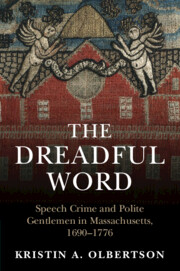'Olbertson reveals how, prior to the Revolution, prosecution of speech misbehavior increasingly marked the boundaries between the refined and the vulgar. Convictions (and acquittals) for threats, contempt, defamation, and false reports distinguished the 'lower sort' from their 'betters'. Slowly but surely, Massachusetts judges and juries gave greater weight to sensibility, civility, and credibility as markers of distinction, while moving away from prosecuting sinful speech and toward defining genteel masculinity. A tour de force.'
Sally E. Hadden - Western Michigan University
'Olbertson builds on two generations of scholarship that have taught us to understand New England’s legal culture as enmeshed with English notions of hierarchy. She transforms our understanding by her relentless and pointed focus on the ways speech offences were, for a time at least, integral to governance. A witty and beautifully researched study of how, in a time and place that prized sincerity and restraint and deference, noise and irreverence were everywhere.'
Hendrik Hartog - author of The Trouble with Minna: A Case of Slavery and Emancipation in the Antebellum North
'Kristin Olbertson has given us a wide-ranging, wonderfully textured, and deeply insightful exploration of how generations of elites in early Massachusetts reinforced their identity and patrolled the boundaries of the status they claimed by criminalizing the speech of people they deemed their inferiors or who might challenge their authority. The Dreadful Word is a masterly accomplishment that teaches us not simply to see the past with new understanding, but to hear it, as well.'
Bruce H. Mann - Harvard Law School
‘Through her careful and perceptive scholarship Kristin Olbertson has deepened our knowledge of law as an instrument for maintaining social, gender, and racial hierarchies in the eighteenth century.’
Lindsay Campbell
Source: Criminal Law and Criminal Justice Books
‘This book makes a significant contribution to our understanding of how social class was reinforced by law and culture in colonial Massachusetts. … It is, in many ways, a model of what legal history should look like.’
Anne Lombard
Source: The William and Mary Quarterly
‘Early in the book, Olbertson quotes a source as complaining, ‘The dreadful Word DAMN is in almost every Body’s Mouth’ (p 20). Thanks to Olbertson’s careful work and extensive mining of these difficult historical sources, the twenty-first-century reader can now hear this dreadful word and many others in the mouths of the citizens - both raucous and polite - of eighteenth-century Massachusetts.’
Jessica Lowe
Source: American Journal of Legal History



